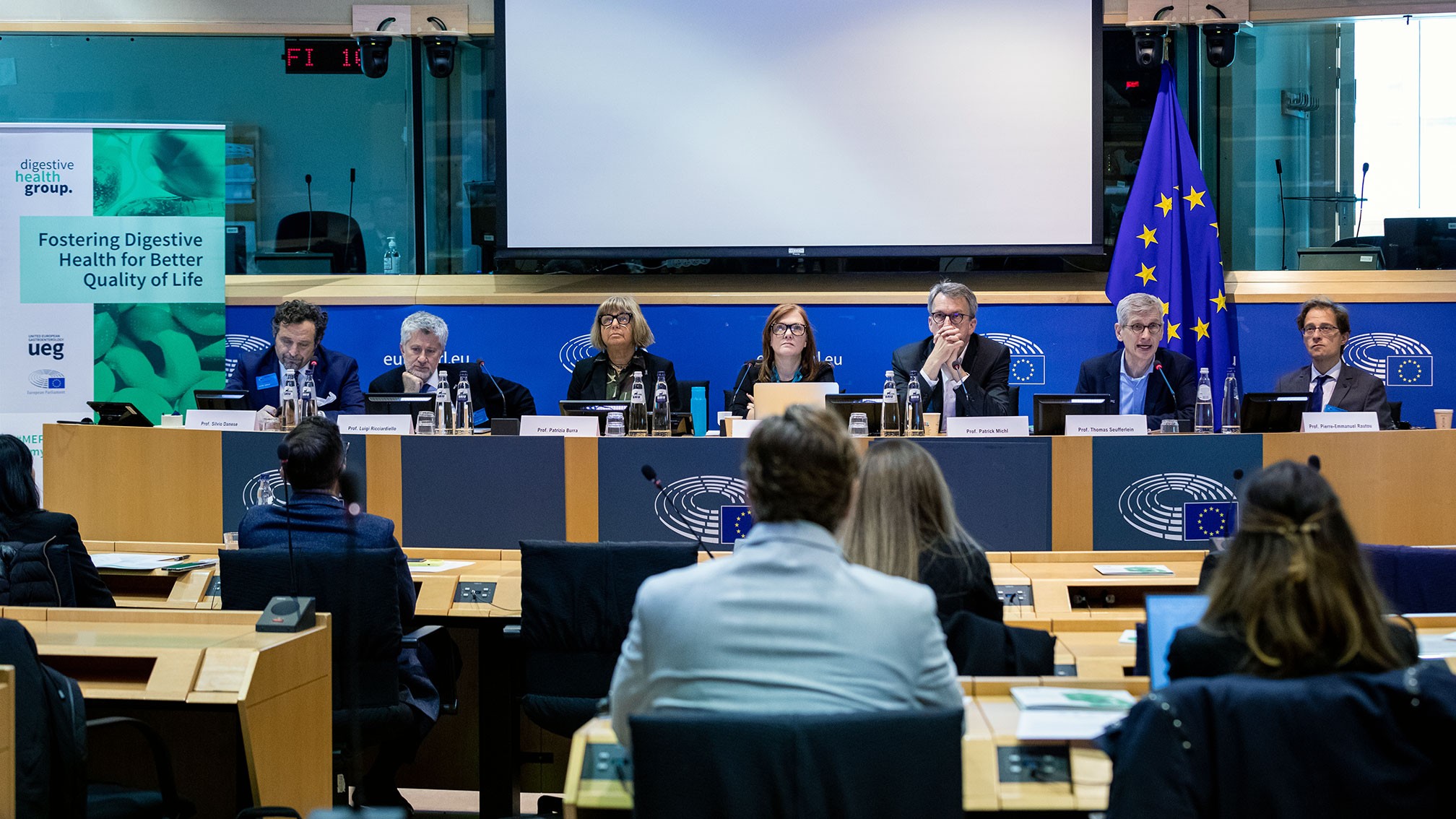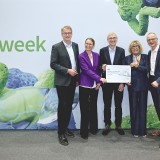
Leading experts on digestive health presented the latest data and trends at European Parliament, calling for key stakeholders from the European health community to take action to help prevent digestive diseases and start to alleviate the growing health and economic burden facing Europe.
United European Gastroenterology (UEG) recently commissioned and published the White Book 2, a pan-European study on the burden of digestive diseases and cancers. The data revealed the rising health and economic toll these diseases exert on societies in terms of disability and premature mortality, as well as on health system expenses and productivity losses. In 2019 alone, there were an estimated 72 million incident cases of digestive disease across Europe, translating to €25.3 billion in direct healthcare costs.
How can we turn this data into action?
This was exactly the question up for discussion during a multi-stakeholder event at European Parliament on 26 April 2023. Hosted by the Chair of the MEP Digestive Health Group (DHG) and UEG, policymakers and leading European experts in digestive health came together to discuss bridging the gaps in digestive disease prevention. The solution-oriented discussion utilised key insights from the White Book 2 and expert experience to sketch out a framework for future action in the prevention of digestive disease across Europe.
“Our efforts need to go beyond this room and beyond this meeting”, opened Lana Crnjac, Health Policy Adviser, who spoke on behalf of MEP Romana Jerković, Chair of MEP DHG. “
Studies such as this one are crucial for doing science-based and informed policymaking. Scientific knowledge helps us understand the problem, develop our policy response based on the evidence and then evaluate the impact of policy measures that we have undertaken. Having this evidence makes it harder to simply turn our heads away from the problem and build a better case for the EU and the member states to introduce the changes and implement the necessary policies, starting from better prevention to stronger public awareness and increased research and funding. Together with the UEG, we are delighted to co-host this event today and indeed to help to bridge the existing gap.”
Patrizia Burra, Chair of the UEG Public Affairs Group, set the scene with an introduction to UEG, highlighting the importance of fostering collaboration between all stakeholders involved in healthcare.
“Our strength is really the multidisciplinarity – from basic to clinical scientists, from oncologists to the primary care practitioners, nurses and students.”
“As specialists, we know that there is a big burden of digestive diseases across Europe, but we wanted to provide numbers and see whether between the year 2000 to 2019 there have been changes,” explained Luigi Ricciardiello, Member of the UEG Public Affairs Group, as he introduced the UEG White Book 2.
Pierre-Emmanuel Rautou, of the European Association for the Study of the Liver (EASL), focused on some of the data relating to liver disease, noting the significant role alcohol consumption has played in the growing disease burden. He also noted, “for liver disorders in Europe, [there is] a huge burden; there is a huge economic impact because this is a working-age population, and there is a need for more funding.”
Patrick Michl, of the European Pancreatic Club (EPC), shared data on the growing impact of pancreatic disorders, citing reports of half a million new cases of chronic pancreatitis in Europe every year. Similar to the issues seen with liver disorders, he noted the impact not just of alcohol but also smoking and obesity on the rising numbers.
“Alcohol, smoking and obesity are the three risk factors most significantly causing this disease. I think we have a problem there, which we need to address by investing in primary prevention – education of the people on the international but also on a European level.”
Silvio Danese, Chair of the UEG Research Committee, spoke of the debilitating nature of inflammatory bowel disease (IBD) and forecasts an ever-growing incidence rate.
“The estimate is that in the next 10 years, we will have one [person] out of 100 affected by inflammatory bowel disease. This is a disease that not only affects the morbidity of patients but has also seen rates of mortality increase by 12% [over the last two decades].”
Numbers were also shared relating to digestive cancers, including the most common – liver, pancreatic, oesophageal, stomach and colorectal cancers.
“Digestive cancers are, unfortunately, on the rise in Europe, with a 26% increase in incident cases between 2000 and 2019…and digestive cancers are responsible for one-third of cancer-related deaths in the UEG member countries,” highlighted Thomas Seufferlein, of the European Society of Digestive Oncology (ESDO).
He continued, “Digestive cancers are a major health and society burden for European countries. There's about 50 million years of life lost due to premature mortality and about one and a half million years of healthy life lost due to disabilities. We have some modifiable risk factors – smoking, alcohol, high BMI, sedentary lifestyle. 40% of all digestive cancers could be completely avoided by appropriate prevention. So, we need effective preventive strategies focusing on a positive change in our lifestyle.”
Thomas Seufferlein also highlighted an important point, transitioning into the second half of the event. “We need research on implementation for preventive measures. We know what to do, but we don't really get the message to the people.”
The second half of the event featured a panel discussion focused on turning this data into action.
“I think the first important step is communication, and that's why we are here. The communication to the population, to the citizen, should be very, very clear,” said Patrizia Burra. “It's really crucial reaching out [to] all different countries, with different governmental institutions, and try to design together a policy to develop the proper prevention of those diseases.”
“This White Book shows not enough is being done to prevent citizens from becoming patients,” says Zorana Maravic, CEO of Digestive Cancers Europe (DiCE).
As a representative of the patient perspective, Zorana Maravic added, “We anticipate the burden on our patients to increase with the number of cases being diagnosed each year increasing and [impacting] health budgets. So, I'm worried that our patients will be even more affected and the access to treatment and care will be really difficult.”
Zorana Maravic also highlighted the important position Europe has in advancing medical knowledge. “Europe wants to be a world class leader in innovation and technology. Currently, we are not seeing that clinical trials are available, and some of our patients really have to go around the world. We should do better.”
To shed some light on what this White Book data could help Europe do from a policy perspective, Stefan Schreck, Adviser for Stakeholder Relations, European Commission Directorate-General for Health and Food Safety (SANTE) joined the discussion.
“It is very important to have good data. They are needed to justify policy and to prioritise within policies,” said Stefan Schreck. He continued by highlighting the potential for joint efforts across multiple disease areas.
“The risk factors which have been mentioned, in many cases, are also risk factors for other diseases. And that’s why we think what is useful is an approach that takes into account the links between the different issues and disease areas. Therefore, we are planning a new joint action on health determinants, which addresses the risk factors which are important for digestive diseases, but also for other diseases.”
Kremlin Wickramasinghe, Acting Head of the World Health Organisation Non-Communicable Diseases (WHO-NCD) office and WHO Europe, also joined the panel discussion and noted the impact that COVID-19 has had on digestive diseases in Europe.
“We saw in almost all the [member state] countries some sort of service disruption for prevention.” This poses new challenges for the EU.
Kremlin Wickramasinghe also raised an important question: “Can we build the science and capacity in our countries to look at the implementation of either EU-level programmes or national-level programmes and learn the facilitators and barriers [to implementation]?” Currently, very little EU funding goes to implementation research, so we do not have a clear picture as to the best and most cost-effective interventions.
So, how do we move from having great ideas to great implementation?
“Everybody has a role to play,” says Stefan Schreck. “We have, in recent years, become much better at [involving everybody].”
He continued, “This collaboration between different parts of society can still be improved, and this is clearly something on which we will have to work more in the future.”
“That is really a very important part of the discussion,” added Patrizia Burra. “The member states, they have their role, they have their duties, they have their tasks and responsibilities. But I believe that actions start from an EU level.”
She continued, “Starting from simple things, such as the education of primary school children, for example, about lifestyle, knowledge, about drinking or eating… I think it can be put in place according to a translational programme involving different commissions, different professions, but we don’t see that yet.”
“The culture is changing. The world is changing. The environment is changing. If we do not take action in making some clear, strategic plan, the next generation will have it even more difficult.”
“Meetings like this one are just the beginning,” says Zorana Maravic. “From the report, it’s really clear that it will actually cost more if we don’t do something about it. So, we simply have to do something and prevent citizens from becoming patients.”
This event was hosted by the Chair of MEP Digestive Health Group, MEP Romana Jerkovic. The MEP DHG is a cross-party platform of members of European Parliament from different EU member states, acting as the voice for digestive health and prompting European action to reduce the burden of digestive diseases.




Please log in with your myUEG account to post comments.